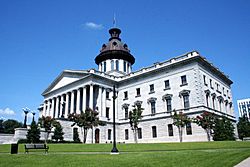Robert Ford (politician) facts for kids
Quick facts for kids
Robert Ford
|
|
|---|---|
| Member of the South Carolina Senate from the 42nd district |
|
| In office 1993–2013 |
|
| Preceded by | Herbert Fielding |
| Succeeded by | Marlon Kimpson |
| Member of the Charleston City Council | |
| In office 1974–1992 |
|
| Personal details | |
| Born | December 26, 1948 New Orleans, Louisiana |
| Political party | Democratic |
| Residence | Charleston, South Carolina |
| Alma mater | Grambling State University, Wayne State University |
| Occupation | Politician |
| Website | Senator Robert Ford |
Robert Ford (born December 26, 1948) is an American politician. He was a member of the Democratic Party. For 20 years, from 1993 to 2013, he served in the South Carolina Senate. He represented the 42nd District in Charleston. Before that, he was on the Charleston City Council from 1974 to 1992.
Ford was very active in the civil rights movement. This was a major effort in the 1950s and 1960s to end unfair laws and treatment against African Americans. As a senator, some of his ideas and statements were seen as controversial. In 2010, he ran for Governor of South Carolina but did not win his party's nomination. He left the Senate in 2013 after questions were raised about his use of public money.
Contents
Early Life and Civil Rights Work
Robert Ford was born in New Orleans, Louisiana. His parents were respected leaders in the African American community. He went to Wayne State University and Grambling State University.
In 1969, he was expelled from Grambling State for leading civil rights protests. At the time, many universities, even historically black colleges like Grambling, received money from state governments that were against ending segregation. Segregation was the forced separation of people based on race.
From 1966 to 1972, Ford worked for the Southern Christian Leadership Conference. This was a famous civil rights group. He even worked with Martin Luther King Jr. on the 1968 Poor People's Campaign, a project to fight poverty. Ford continued this work even after King's death. Because of his work in protests, he was arrested many times.
Political Career
Ford's career in government began when he was elected to the Charleston City Council. He served there from 1974 to 1992.
In 1992, he was elected to the South Carolina State Senate and started his term in 1993. The people in his district reelected him four more times. He was known for being an entertaining but sometimes controversial politician. He resigned from the Senate on May 31, 2013.
Key Political Positions

As a senator, Ford introduced many bills, which are ideas for new laws. He was often successful in helping create compromise bills, where politicians with different ideas agree on a solution.
The Confederate Flag Debate
One of Ford's biggest goals was to remove the Confederate battle flag from the top of the South Carolina State House. For many people, this flag was a symbol of racism and a painful past. After many years of debate, Ford helped write a compromise law. The law moved the flag from the capitol dome to a monument on the grounds.
Creating State Holidays
In 1998, Ford helped pass a law that made Martin Luther King, Jr. Day a paid holiday for state workers. The same law also recognized Confederate Memorial Day. Ford hoped this would help improve relationships between people of different races in South Carolina.
Laws and Public Safety
Ford believed that judges should be elected by the people. He also supported giving police more authority to keep communities safe. He wanted stronger punishments for serious crimes.
He also focused on the financial industry. He sponsored a ban on payday lending, a type of loan that often charges very high interest and can trap people in debt.
Education and Community
Ford believed more money was needed for school programs. He was concerned that students were not learning enough about subjects like geography and civics (the study of government). He wanted to make civics a required subject in schools again.
He also spoke out about problems he saw in the South Carolina Highway Patrol. His actions led to the leaders of the state's public safety department resigning.
Protecting People's Rights
Ford introduced laws to protect people from hate crimes. A hate crime is an attack or threat made against someone because of their race, religion, gender, or other personal identity. He also introduced bills to support the rights of LGBT people, including rights for hospital visits and partnerships similar to marriage.
2010 Run for Governor
In 2010, Ford ran for Governor of South Carolina. One of his main ideas was to bring back video poker (a type of electronic gambling). He believed that taxing it could raise money for the state budget.
He competed against two other Democrats in the primary election. A primary election is a vote to decide which candidate will represent a political party in the main election. Ford came in third place and did not become the party's candidate for governor.
Summary of Elections
- 1992: Ford won his first election to the South Carolina Senate.
- 1996: He was reelected, defeating a Republican opponent.
- 2000: Ford won a close primary election and then won the general election without an opponent.
- 2004: He easily won his primary and was reelected in the general election.
- 2008: Ford won his primary election by a large margin and was reelected again.
- 2012: He was reelected without any opponents in the primary or general election.
 | Shirley Ann Jackson |
 | Garett Morgan |
 | J. Ernest Wilkins Jr. |
 | Elijah McCoy |

